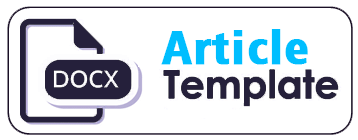PENGEMBANGAN STRATEGI BERTAHAN UMKM BATIK DI KOTA SEMARANG PADA MASA PANDEMI COVID-19
Keywords:
MSME, COVID-19, Batik SemarangAbstract
The impact of the COVID-19 pandemic on MSME entrepreneurs was felt in the Semarang. The MSME clusters most affected by the COVID-19 pandemic are the Milkfish, Culinary and Batik clusters. Especially for the Batik MSMEs cluster in Semarang City before the crisis caused by Covid 19, the business conditions of the Batik MSMEs in the batik village have also experienced a decline in sales. The business development strategy can be applied as one of the MSME survival strategies, especially for Batik MSMEs. The research method used in this study is qualitative analysis with exploratory steps with participatory observation techniques. This study uses SWOT analysis as a tool used in formulating strategies to survive in the midst of this pandemic by using a list of questionnaires. The results of the survey that have been carried out show that during the COVID-19 pandemic which began to spread in Indonesia in early 2020 until now, Semarang batik craftsmen experienced a very significant decline in turnover. From the survey data, it can be seen that there are 47% of Semarang batik artisans who experienced a decrease of 81% even up to 100%, while the lowest decline in turnover of 21% to 40% was experienced by 6% of respondents as Semarang batik artisans. From the perspective of Porter's Competitive Power Model, the Semarang Batik Cluster MSMEs business actors have problems in terms of traditional competitors, where their traditional competitors are fellow Semarang batik entrepreneurs. The next problem is the presence of newcomers, during this pandemic it is not uncommon for people who are laid off from their jobs or experience business setbacks to try to find new business opportunities to cultivateReferences
DAFTAR PUSTAKA
Agyapong. “Micro, Small and Medium Enterprises”™ Activities, Income Level and Poverty Reduction in Ghana ”“ A Synthesis of Related Literature,” International Journal of Business and Management, vol. 5, no. (12), pp. 196-206, 2010
Agustina, L., Jati, K. W., Baroroh, N., Widiarto, A., & Manurung, P. N. (2021). Can The Risk Management Committee Improve Risk Management Disclosure Practices in Indonesian Companies?
Crismawan, A. B. (2020, Juli 28). Retrieved from Genial: http://genial.id/read-news/pengaruhcovid19-terhadap-umkm-di-indonesia
Intan Liva K (2020 April 30) Ribuan UMKM di Kota Semarang Kena Dampak Corona Retrieved Maret 28 2021
https://www.gatra.com/detail/news/477446/ekonomi/ribuan-umkm-di-kota-semarangkena-dampak-corona
Putri, A. G., Pradita, N., & Fitriati, I. R. (2019, July). The Influence of Attitude and Herding on the Credit DecisionMaking of Micro, Small, and Medium Enterprises. In International Conference on Banking, Accounting, Management, and Economics (ICOBAME 2018) (pp. 69-73). Atlantis Press.
Retnawati, B. B., Leong, M., & Irmawati, B. (2020). Kondisi Eksisting Usaha Mikro Dan Kecil Kerajinan Bahan Alam Di Kota Semarang Dalam Bertahan Menghadapi Krisis Akibat Pandemi. Fokus Ekonomi: Jurnal Ilmiah Ekonomi, 15(2), 462-476.
Rizal, J. G. (2020, Agustus 11). KOMPAS. Retrieved from Kompas.com: https://www.kompas.com/tren/read/2020/08/11/102500165/pandemi-covid-19-apa-saja-dampak-pada-sektorketenagakerjaan-indonesia-?page=all
Sandi, F. B. (2020, Juni 24). Peran UMKM di Indonesia yang Perlu Anda Ketahui. Retrieved November 16, 2020, from pajak: https://www.onlinepajak.com/seputar-pph-final/peranumkm
UNICEF. 2021. Menuju respons dan pemulihan COVID-19 yang berfokus pada anak: Seruan aksi. Jakarta: United Nations Children”™s Fund.
http://iaiglobal.or.id/v03/standarakuntansi-keuangan/home
https://dinkopumkm.jatengprov.go.id/dampakcovid/pemetaan/statistik diakses pada tanggal 27 Maret 2021
http://lipi.go.id/berita/survei-kinerjaumkm-di-masa-pandemi-covid19/22071 diakses pada tanggal 27 Maret 2021
BPS. 2020. Indikator Ekonomi Kota Semarang 2020. Semarang: BPS Kota Semarang
Downloads
Published
Issue
Section
License
The copyright of the received article shall be assigned to the journal as the publisher of the journal. The intended copyright includes the right to publish the article in various forms (including reprints). The journal maintains the publishing rights to the published articles.

This work is licensed under a Creative Commons Attribution 4.0 International License.






